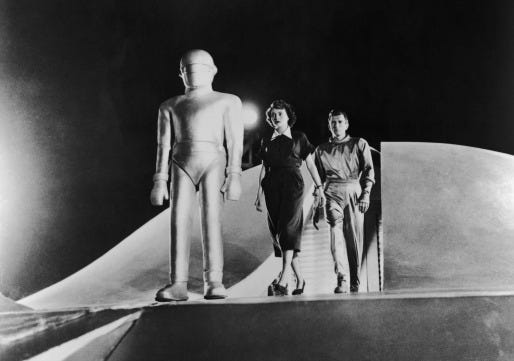The Day the Earth Stood Still (1951)

Honestly, I found it a little slow. And heavy-handed.
"The Day the Earth Stood Still" has lived far too long on my list of iconic classic films that I've never seen. The fact that I had watched the awful 2008 remake with Keanu Reeves but not the original weighed on my conscious as someone who purports to be a serious critic.
I can see why many people regard it as one of the most seminal science-fiction movies ever made. The special effects, for 1951, were quite extravagant, with the spaceship descending upon the National Mall in Washington D.C. like an angelic discus. Gort, the 8-foot-tall metal(ish) robot who acts as the alien ambassador's personal bodyguard as well as the turn-the-Earth-into-a-cinder failsafe for his mission, is scary enough and imposing.
(Even if his legs do crinkle at the back of the knee like trousers when he walks.)
With a ton of extras, military hardware, scenes of chaos from around the globe, armies of vehicles being moved around, an A-list director in Robert Wise and a musical score by the great Bernard Herrmann, it had the scope of a big-budget spectacle in what is really a B-movie at heart.
Sometimes just being first gets you forever tagged as the best, too. Indeed, "Day" established many of the tropes of science fiction, from Herrmann's use of a theremin to suggest something alien and eerie, to the saucer-like shape of spacecraft. You also have robot sidekicks who frequently pose a threat to humans.
But perhaps its most lasting legacy is as a piece of cautionary propaganda. You may already know the basics of the story: Alien ambassador Klaatu (Michael Rennie) comes to Earth to deliver a message of peace, and a warning. But he's shot and wounded by a jittery soldier and, after escaping from the hospital, becomes a fugitive from justice.
After slumming around at a boarding house and getting to know some humans, Klaatu warns that the grand federation of peaceful planets are disturbed by humans' development of atomic weapons and missiles, which they see as a threat to their tranquility. Unless mankind chooses to put aside its squabbles and embrace non-violence, they will have no choice but to turn the planet into a smoking ruin.
Most subsequent films and TV shows about humans encountering a more scientifically advanced alien race involve some aspects of this rather paternalistic disposition: "Behave, or you'll be spanked." You can also see it flipped around in the Prime Directive of the Star Trek universe, which essentially treats more primitive cultures as children to be watched over with benevolent neglect.
I'd like to talk a little bit about the philosophy embodied by Klaatu, since it's pretty clear that director Wise and screenwriter Edmund H. North (based on a short story by Harry Bates) enthusiastically agree with the sentiments espoused.
For starters, it's totalitarianism. "Conform to our expectations of behavior or we'll end you" is hardly an example of the exercise of free will. People who are peaceable only because they'll be killed if they aren't haven't really embraced non-violence as a way of life. Rather, the explicit threat of violence against them is what prevents them from expressing their passions, even if it is in negative and destructive ways.
In my experience, people who are forced to bottle up their emotions in one way usually find an awful way to express them in another venue.
I also feel compelled to point out that Klaatu and Gort are rather slippery on the internal logic of their own dictums. Klaatu describes Gort, who fires an energy beam out of his visor that can vaporize anything, as part of an intergalactic police force that enacts the will of the peace-loving planets. He states that this enforcement exists outside of their control, and that once it has begun, they do not have the power to stop it.
Except, of course, that's exactly what happens, when Klaatu instructs a sympathetic human woman (Patricia Neal) to utter the phrase "Klaatu barada nikto" to Gort after he has been killed. Apparently it's a failsafe command that instructs the robot to halt his attacks upon humans and retrieve Klaatu's corpse so it can be revived.
In a late change to the script at the behest of Hollywood censors, Klaatu reveals that his resurrection is to be short-lived, since the ultimate power over life and death is reserved for "the Almighty Spirit." This underlines the suggestion of Klaatu as a Jesus-like figure — he arises from the dead, but then departs for the heavens. While hiding out, he goes by the name of "Carpenter," after the name on the suit he stole, which was the vocation of Christ.
Sam Jaffe has a small but effective role as Professor Jacob Barnhardt, the world's leading scientist who is recruited by Klaatu to present his message to like-minded individuals, since he can't convince the President of the United States or other world leaders to meet with him. (It's never made exactly clear why POTUS won't do this; we're simply told it's "impossible.")
The beginning and end of the film are terrific sci-fi, though the middle section drags badly, with Rennie wandering around with his congenial smile, pulling a "My Alien Father Knows Best" act.
"The Day the Earth Stood Still" is one of those Great Movies that assumed its mantle of greatness without ever escaping the fact that it's merely good. The film hasn't aged well, but then again, not many of us do.
4 Yaps



